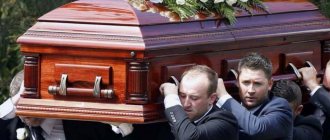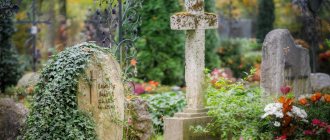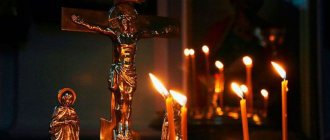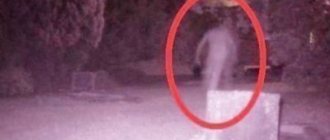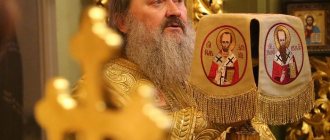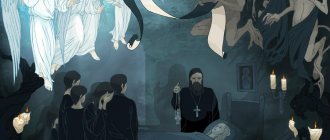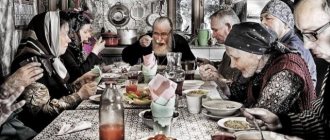People of all religions have always believed that the human soul does not die with the body, but continues to live in the other world. This has now become a scientific fact. Some doctors have explored this issue by asking those patients who died but were revived after resuscitation.
Man is not an animal. His personality, his “I” continues to live even after the death of the body, the personality is indestructible. What happens to the human soul when, after separation from the body, it enters the spiritual kingdom?
The Orthodox understanding of the life of the soul after death is based on Holy Scripture and Holy Tradition (the experience of the holy fathers, liturgical texts, lives of saints). Trying to comprehend the other world, the posthumous state of the soul and its ordeal, we must keep in mind that everything there is not the same as here, everything there is completely different.
What is ordeal?
“Ordeal is an image of a private Judgment after death, at which the entire life of the deceased is reviewed with all sins and good deeds” (St. Theophan the Recluse, 1815-1894).
The earthly life of every person is the most important and responsible time in the salvation of the soul. The state of the soul in eternity depends on how this earthly life passes. After death, a private Judgment takes place over all people to determine the place of residence of the soul before the General Judgment. According to the teachings of the Holy Fathers, the soul of the deceased “goes through” ordeal. These are a kind of obstacles on the way to Heaven.
Old Russian image of the “staircase of ordeals”
Death and the Christian
Death always remains a kind of constant companion of a person: loved ones, celebrities, relatives die, and all these losses make me think about what will happen when this guest comes to me? The attitude towards the end largely determines the course of human life - the wait for it is painful or a person has lived such a life that at any moment he is ready to appear before the Creator.
Read about the afterlife in Orthodoxy:
- Soul 40 days after death
- Orthodox burial rite
- 9 days after death
Trying not to think about it, erasing it from your thoughts, is the wrong approach, because then life ceases to have value.
Christians believe that God gave man an eternal soul, as opposed to a corruptible body. And this determines the course of the entire Christian life - after all, the soul does not disappear, which means it will definitely see the Creator and give an answer for every deed. This constantly keeps the believer on his toes, preventing him from living his days thoughtlessly. Death in Christianity is a certain point of transition from worldly to heavenly life , and where the spirit goes after this crossroads directly depends on the quality of life on earth.
Orthodox asceticism has in its writings the expression “mortal memory” - constantly holding in thoughts the concept of the end of worldly existence and the expectation of the transition to eternity. That is why Christians lead meaningful lives, not allowing themselves to waste minutes.
The approach of death from this point of view is not something terrible, but a completely logical and expected action, joyful. As Elder Joseph of Vatopedi said: “I’ve been waiting for the train, but it still doesn’t come.”
The first days after leaving
Orthodoxy has a special concept about the first days in the afterlife. This is not a strict article of faith, but the position held by the Synod.
Death in Christianity is a certain point of transition from worldly to heavenly life
Special days after death are:
- The third is traditionally the day of commemoration. This time is spiritually connected with the Resurrection of Christ, which occurred on the third day. St. Isidore Pelusiot writes that the process of Christ’s Resurrection took 3 days, hence the idea that the human spirit also passes into eternal life on the third day. Other authors write that the number 3 has a special meaning, it is called God’s number and it symbolizes faith in the Holy Trinity, therefore a person should be remembered on this day. It is in the requiem service of the third day that the Triune God is asked to forgive the deceased’s sins and forgive him;
- The ninth is another day of remembrance of the dead. St. Simeon of Thessalonica wrote about this day as a time to remember the 9 angelic ranks, to which the spirit of the deceased can be ranked. This is exactly how many days are given to the soul of the deceased to fully understand its transition. This is mentioned by St. Paisius in his writings, comparing a sinner with a drunkard who becomes sober during this period. During this period, the soul comes to terms with its transition and says goodbye to worldly life;
- The fortieth day is a special day of remembrance, because according to the legends of St. Thessalonica, this number is of particular importance, because Christ was ascended on the 40th day, which means that the deceased on this day appears before the Lord. Also, the people of Israel mourned their leader Moses at such a time. On this day, not only should there be a prayer asking for mercy from God for the deceased, but also the magpie.
Important!
The first month, which includes these three days, is extremely important for loved ones - they come to terms with the loss and begin to learn to live without a loved one. The above three dates are necessary for special remembrance and prayer for the departed. During this period, their fervent prayers for the deceased reach the Lord and, in accordance with the teachings of the Church, can influence the final decision of the Creator regarding the soul.
Is ordeal a reality?
Many people are concerned about the question: ordeal - what is it: reality or myth? The doctrine of ordeals is not a dogma of the Orthodox Church. This is largely an educational plot of Christian theology, having a pedagogical character. Church writers of the 4th and 5th centuries mentioned aerial ordeals: St. John Chrysostom (347-407), Ephraim the Syrian (306-373), Macarius the Great (300-391), Cyril of Alexandria (376-444) and others.
In the 10th century, the “Life of St. Basil the New” contained a story about the ordeals of Blessed Theodora of Constantinople. Currently, there is a lot of documentary evidence of people who have experienced clinical death. All of them unanimously affirm the existence of obstacles on the path of the soul after death. However, there are some differences in the description of specific ordeals, but the basic idea is the same for all. Hieromonk Seraphim Rose (1934-1982) explains the various stories about the ordeals:
“This is a metaphor that the Eastern Fathers found appropriate to describe the reality that the soul faces after death. It is also obvious to everyone that some elements in the descriptions of these ordeals are metaphorical or figurative. But these stories themselves are not allegories or fables, but true stories about personal experience, presented in the language most convenient for the storyteller.”
Are there special cases of ascent to Heaven?
History knows such examples. In general, the purer the soul, the freer its aspiration will be. Let us suppose that the soul of the Most Holy Theotokos, after the Dormition, was personally received by Christ.
***
Metropolitan Hilarion Alfeev: Regardless of how literally the evidence of ordeals is taken - whether ancient or modern evidence - the teaching that a person will be tested after death should be considered generally accepted for the Orthodox tradition. This test in textbooks on dogmatic theology is called a “private judgment”, in contrast to the general Last Judgment at which the final posthumous fate of each person is determined.
Ordeals of the soul from the life of Theodora of Constantinople
The most detailed account of the aerial ordeals is the story of St. Theodora of Constantinople. She lived in Constantinople in the 10th century, was a pious widow, and helped the poor and strangers. After taking monastic vows, she lived under the spiritual guidance of St. Basil the New (10th century). The Monk Theodora ended her earthly life at an old age. Her fate after death became known through the disciple of St. Basil the New, Gregory. One day Gregory saw in a dream a beautiful garden, where he met Theodora.
Gregory asked her about the separation of the soul from the body and the afterlife. She told about the appearance of evil spirits who had thick books indicating her misdeeds throughout her life. Two Angels also appeared before her, who accompanied her soul as it ascended to heaven. On the way, she went through ordeals, evil spirits presented the sins she had committed. The angels contrasted and justified her good deeds. When there were not enough good deeds to go through the ordeal, they were “bought off” with the gifts of St. Basil the New, given at the beginning of the journey. The Holy Fathers interpret these gifts as prayers of the saint to God for the deceased. After going through all the ordeals, Theodora’s soul entered the gates of heaven and bowed to the Throne of God.
Gregory decided to tell his vision to Saint Basil the New. However, he himself got ahead of him with his story, confirming that this was not a demonic obsession. With the blessing of the elder, the vision was recorded for the spiritual education of many Christians.
Which of the two approaches is the most correct?
Both the first and second assessments of the role of ordeals in determining the fate of the soul are fully consistent with the letter and spirit of Scripture:
- In both the first and second cases, the Lord is recognized as the Judge, in accordance with His precise warning: “Vengeance and reward are mine” (Deut. 32:35); “I will repay” (Rom. 12:19).
- Both the first and second explanations are consistent with the formula: “God cannot be mocked. Whatever a man sows, that he will also reap” (Gal. 5:7-8); “It is appointed for men to die once, but after this the judgment” (Heb. 9:27).
Meanwhile, with a certain degree of confidence, we can say that the second approach still sharply focuses attention on the moral truth that the possibility of relocation to the heavenly abodes is associated with the inner ability of the soul to live in unity with God and neighbors, to live according to the law and norms of the saints. If the soul, during its life on earth, has not developed such an ability, it is condemned to torment in hell. What should she do in the Kingdom of Saints? In addition, this approach is more obviously similar to the words: “It is easy for the Lord to reward a person according to his deeds on the day of death” (Sir.11:26).
List of ordeals
The first is the ordeal of idle talk. On it the soul is tested to utter idle, shameless and blasphemous words.
The second is the ordeal of lies. The human soul is tested by uttering false words, invoking the name of God in vain (for example, in jokes), perjury, perjury, concealing sins in confession, and making vain promises to God.
The third is the ordeal of condemnation and slander. The soul of the deceased is checked for condemnation, slander, and ridicule of people.
The fourth is the ordeal of gluttony and drunkenness. Excessive consumption of food and alcoholic beverages interferes with mental and spiritual functioning. It relaxes the body, making it subject to the influence of other passions.
At the fifth ordeal, the sin of laziness is tested. Here the soul is presented with wasted time, which it did not use profitably for salvation.
The sixth is the ordeal of theft and theft, a direct violation of the seventh commandment (Book of Exodus, 20:15).
At the seventh ordeal, the sins of love of money and stinginess are revealed.
Eighth - the ordeal of extortion. This sin is committed by people who lend money at interest.
At the ninth ordeal, the soul is tested for the sin of untruth and hypocrisy.
The tenth ordeal is a test of the soul for the sin of envy.
At the eleventh ordeal, the soul is tortured for the presence of pride.
At the twelfth ordeal, the soul is tested for anger and rage.
The thirteenth is the ordeal of anger.
At the fourteenth ordeal the sin of murder is tested. This is a violation of the fifth commandment.
The fifteenth is the ordeal of magic, witchcraft and appealing to evil spirits.
The sixteenth is the ordeal of fornication. Here, not only complete fornication is tested, but also passionate thoughts.
The seventeenth is the ordeal of adultery (adultery).
The eighteenth is the ordeal of Sodomy sin. These are sins committed against male and female nature when “natural use” is replaced by unnatural use.
The nineteenth is the ordeal of heresy (false doctrine).
The twentieth is the ordeal of unmercifulness and cruelty. Mercy is one of the attributes of the Lord. Therefore, at the last obstacle to the heavenly abodes, participation in God's mercy is tested. After all, man is the image and likeness of God.
How to pass the ordeal
To ascend to heaven, the necessary conditions are the presence of good deeds in earthly life. They can tip the scales of ordeal in deciding the fate of the deceased.
“The easiest path to salvation is love and humility. If we don't have them, we will be judged. These two virtues bend God to mercy and elevate His creatures to Heaven. By these distinctive signs - by humility and love - the holy Angels identify the children of God, take them with love and without fear lead them through aerial ordeals, and lead them to a tenderly loving Father, God” (Rev. Paisius the Svyatogorets, 1924-1994).
Sins that accumulate during earthly life are forgiven to a person in the Sacrament of Confession. Just don’t put it off until last, as you might simply not have time.
“If a person is late for a meeting with another person, then you can ask him for forgiveness. If you are late for work, you can write an explanatory note. But if you are too late to reconcile with God, then this tragedy will have eternal consequences” (Archpriest Oleg Stenyaev).
What should relatives do?
All these days, according to Russian custom, in the holy or red corner where the icons are located, there should be a “pomen” - a glass of water and a portion of bread. And relatives and friends pray and ask for peace and God's mercy for his soul.
For a soul that has gone to another world, time, in our concept, does not exist. But the love and mercy shown by relatives towards the deceased determines what the coming eternity will be like for him.
On the 40th day, the main commemoration of the deceased person is held, which is especially revered in the Orthodox religion.
His soul leaves the earth. Traditions and rituals of the entire forty-day period are associated with the stages of her gradual departure and special farewells that prevent the deceased from returning to relatives or close people.
Opposite ideas about ordeals
The Orthodox teaching on ordeals is important in the salvation of Christians. In the “Canon for the Exodus of the Soul,” which is read at the bedside of a dying person, there is even the following troparion:
“Aerial prince, rapist, tormentor, champion of terrible paths and vain tester of these words, grant me permission to pass without restraint from the earth” (canto 4).
So one cannot reject the judgment about the reality of ordeals.
However, people who have just acquired faith can go to extremes. In order to avoid air obstacles in the future, during confession they begin to list all possible sins, saying that they have sinned in everything. But to receive forgiveness from God, it is important to be aware of your sins. Only after this is it possible to bring true repentance.
“Repentance is only true when a person, realizing his sins, with which he angered his Creator, leaves the sinful act, regrets and repents, and is worthy of forgiveness by the grace of Christ through the permission of the clergy of the Church. And when he does not leave, although he repents, then this is not repentance, but even a dangerous, excessive and reckless hope in the goodness of God, which, just like despair, is judged in equal measure before God” (Reverend Macarius of Optina, 1788- 1860).
Do ordeals exist?
Recently, a heated discussion arose on the Internet about attempts to reject the existence of ordeals, and especially the authority of the “Life of St. Basil the New" (his memory is March 26), which is included as an integral part of the "Ordeal of Blessed Theodora." According to opponents of the doctrine of ordeals, the stories about them are a manifestation of pagan and Gnostic stories about the posthumous wanderings of the soul, in which the soul of the deceased, in order to go to heaven, must first overcome demonic barriers.
Based on this and remembering that in one of the medieval “Indexes of Forbidden Books” the “Ordeals of Theodora” are called apocrypha, opponents argue that the ordeals do not exist.
Let me remind you that, according to the traditional teaching of the Orthodox Church, immediately after death a person finds himself in the private court of God. When the soul leaves the body, it is met by Angels and demons who try to take possession of the deceased. But at the same time, we are not talking about a violent clash, but about a dispute about what the soul deserves - hell or heaven. This dispute takes place in the airy kingdom of Satan, where there are always outposts of evil spirits, which are called ordeals.
This dispute is based on the fact that every good deed makes a person like God, and every evil deed makes him a slave of Satan. In fact, this is a “debate of the parties” in an invisible court, in which the verdict is pronounced not by an Angel or a demon, but by the Lord, contrary to the statements of those who reject the ordeal: “Dogmatically, it (the text of the “Ordeal of Blessed Theodora”) is incorrect because it does not leave room for God’s Judgment. The Savior said that “the Father handed over all the judgment to the Son,” but in this book the whole judgment is carried out by demons. All that remains for Christ is to present the medals to the winners.” After all, this is why the Church prays to Christ for the deceased and does good deeds (especially alms) in his memory, which can help change the fate of the deceased. If a person turns out to be enslaved by sin, then demons bring him down to the underworld, where the soul is tormented by the anticipation of future torment and the fire of unquenchable desires. And if a deceased Christian turns out to be imbued with good deeds, if the flame of Divine love burned in his heart, then he is elevated by the Angels to paradise, where God determines his place until the day of the resurrection of the flesh.
This teaching must be distinguished from the Roman Catholic false teaching about purgatory. This heresy is based on the idea that God washes away completely and without satisfaction only sins committed before Baptism, and sins committed later must be “worked off” on Earth with good deeds. If the sins remain without compensation, then they must be compensated by the torment of purgatory (some special place between hell and heaven) or the missing must be obtained from the “treasury of the supererogatory merits of the saints” at the disposal of the pope. This teaching, apart from the truth that the soul of a sinner burns with the fire of insatiable desires and the fact that the prayers and sacrifices of the Church can provide real help to the deceased, has nothing true behind it. The main mistake of this heresy is the assertion that a person can add something to the Sacrifice of Jesus, and this is where this attempt arises to calculate the measure of deeds necessary for salvation. If we abandon this completely unbiblical idea and remember that the Lord Himself accomplishes our salvation, then there is simply no room left for purgatory.
It is clear that the heresy about purgatory as a place of some kind of “working out” and the teaching about ordeals, where the final test of man takes place and where the judgment of God is carried out invisibly, have nothing in common.
Before discussing this idea, I would like to address a completely unbookish topic. Recently, in debates on theological topics, there has been a tendency to resort to a strange system of argumentation. Here we take a certain text that can be understood this way or that. We accept one understanding, reject (for philological, or taste, or ideological reasons) another, and from this we conclude that the reality that this text describes does not exist. So it was with the understanding of the creation of the world, so it was with the question of the possibility of a Christian recognizing the fact of “damage”. This is what happened now. I think that such argumentation is justified in the case when we are talking not about the realities of the spiritual or material world, but about the understanding of a particular text. For example, if you apply this method of criticism to the interpretation of any canon, this method can bring positive results. But then, when we are talking about realities independent of humans, this approach does not work at all. After all, no matter how much we criticize the texts describing the ordeals, the latter will not disappear. As St. Gregory Palamas said, “every word fights with word, but who can refute life?”
Here I would like to share one story from my own pastoral practice. One spring Sunday evening in 2002, I was invited to an apartment in Yasenevsky to say goodbye to a dying woman. I still remember the terrible picture I saw. The dying woman, with her eyes bulging in horror, fought off invisible creatures and shouted: “I'm afraid, get away from me!” I asked her if she wanted to take communion? She agreed and was speechless after that. Shortly before this, I confessed her and therefore without delay gave her the Holy Gifts. Immediately after communion, Nadezhda (that was her name, and I ask all readers to remember her in their prayers) calmed down, smiled and died a few minutes later. And when I hear that stories about demons attacking the dying are superstition, I always remember Nadezhda’s face, distorted with horror. And I don’t understand how you can try to refute the facts?
This is all the more incomprehensible, given that ordeal is the last temptation of a person after leaving the body, and the definition of his posthumous fate is quite obviously derived from Scripture. After all, if death is the departure of the soul from the body (Gen. 35:18) and if the soul desires to ascend to God (Eccl. 12:7), then it is obvious that this path leads through the heavens. Scripture directly says that the heavenly places are the kingdom of Satan (Eph. 2:2) and it is inhabited by spirits of wickedness in high places (Eph. 6:12). It is also known that the devil, like a roaring lion, seeks someone to devour (1 Peter 5:8). He is a murderer and hates people (John 8:44). And it is natural that he tries to take possession of the souls of those who pass through his kingdom. Therefore, that “evil day” (Eph. 6:12–13), which the Apostle Paul mentions as the day of a special battle with the principalities, powers, and rulers of the darkness of this age, with the spirits of wickedness in high places—this is the day of our death.
And this battle begins from the very moment the soul is separated from the body. The righteous are received by Angels and carried to Abraham’s bosom (Luke 16:22), and sinners are “tortured” by certain other creatures (apaitousin Luke 12:20), tormented from their bodies and dragged to hell.
It was this reality (and not mythical ideas) that both Jews and pagans knew (Cf. Ezek. 32, Is. 14). They knew that there were demons (they are also “gods”), and they knew that these evil creatures bring the deceased down to the underworld (hell, Sheol, “the land of no return”) and at the same time remind the deceased of the evil deeds that he created. And this is also no coincidence! After all, according to Scripture, “whoever commits sin is of the devil, because the devil sinned first” (1 John 3:8). That’s why the servants of the devil come for those who belong to them “by copyright.” And then everything belonged to them, for there is no man who has not sinned (1 Kings 8:46). But the measure of their torment was different, as both Scripture knows (see Ezek. 32) and pagan religions. So, regarding the afterlife, the pagans were not so wrong. Their trouble was that they despaired and decided that it was impossible to get rid of the power of hell, that the road beyond heaven to the throne of the Creator was closed forever. But all their ideas about what awaits a person after death were experimental. After all, tens of thousands returned from that world, and it was from them that people learned what awaited a person beyond the grave.
Since the time of redemption, changes have indeed occurred in the posthumous fate of the soul. Christ said: “I am the door: whoever enters through Me will be saved, and will go in and out and find pasture” (John 10:9). So those who through Baptism have entered the Church - the Body of Christ - can ascend to heaven through the door of Christ. They received boldness to enter the heavenly “sanctuary through the blood of Jesus Christ, a new and living way, which He again revealed to us through the veil, that is, His flesh” (Heb. 10: 19-20). But in order to pass this path without hindrance, it is required that a Christian not perform the works of the flesh (Gal. 6:13-20; Rom. 8:13), otherwise he will not inherit the Kingdom of God. It is no coincidence that Blessed Theodora went through the ordeal so difficult. After all, she was a completely ordinary “average parishioner” who had many sins, including the unconfessed sin of adultery. It was these “works of the flesh” that prevented her from ascending to heaven. And only the prayer of her spiritual father, Rev. Vasily helped her rise to heaven. After all, according to the words of the Apostle James, “the fervent prayer of the righteous can accomplish much” (James 5:16). Those who purify their lives through the Sacraments, who do good deeds, who make friends with unrighteous wealth, easily rise to eternal shelters, accompanied by the Angels of God (Luke 16:9).
And this new reality, which arose only after the appearance of God in the flesh, was also seen by thousands of Christians. Even if we reject the authority of “The Ordeal of Blessed Theodora” (and it was recognized by all the great dogmatists of the 19th–20th centuries: Metropolitan Macarius (Bulgakov), Archbishop Sylvester (Malinovsky), Archpriest N. Malevansky, Rev. Justin (Popovich), Archbishop Michael Pomazansky), there is still agreement among the Holy Fathers on this issue. These are the ancient martyrs who prayed to God to avoid the attacks of demons (St. Martyr Eustratius), and saw these attacks themselves (Mt. Perpetua). These are Hippolytus of Rome, and the great Cappadocians (Basily the Great and Gregory of Nyssa clearly teach about this), and Chrysostom, and Augustine, and Athanasius of Alexandria. Saints Cyril of Alexandria and Gregory Dvoeslov, the Pope of Rome, write in great detail about the ordeals. Moreover, the authority of the first Epistle is such that for several centuries it has been printed in the Followed Psalter. I’m not even talking about the countless fathers of the 2nd millennium who unanimously speak about the reality of ordeals (this is Mark of Ephesus[1], and Demetrius of Rostov, and Ignatius (Brianchaninov), and Theophan the Recluse). It is no longer necessary to say that the Fathers of the Desert, “masters of the art of holiness,” starting with St. Anthony the Great and ending with the Optina Elders, they describe in great detail this upcoming terrible test.
St. Cyril of Alexandria, an example of Orthodoxy, writes in the “Sermon on the Exodus of the Soul and the Last Judgment” the following: “Can you imagine, my soul, what fear and horror will overcome you on the day when you see terrible, wild, cruel, merciless and shameless demons, who will stand before you like gloomy Ethiopians? One vision of them is more terrible than any torment. Looking at them, the soul becomes confused, becomes agitated, restless, tries to hide so as not to see them, resorting to the Angels of God.
The soul, supported and elevated by the Angels, passing through the air spaces, encounters ordeals on its way - as if separate groups of spirits who watch over the ascent of souls, delay them and hinder the ascendants. Each ordeal, as a special department of spirits, presents the soul with its own special sins. The first ordeal - the spirits of slander and celiac fury. On it, the spirits represent sins in which the soul has sinned in words, such as: lies, slander, curses, perjury, idle talk, slander, idle talk, blasphemy, curses. They are also joined by the sins of gluttony: fornication, drunkenness, immeasurable laughter, unclean and indecent kissing, lewd songs. Contrary to them, the holy Angels, who once instructed and guided the soul in goodness, reveal that it spoke good with its lips and tongue: they point to prayers, thanksgivings, singing psalms and spiritual songs, reading the Scriptures, in a word - they expose everything that we mouth and brought with their tongues to please God. The second ordeal of the spirits of flattery and deception - to the vision of the eyes. They wear away what passionately amazed our vision, what seemed attractive to the eyes, and attract to themselves those addicted to indecent gaze, to indecent curiosity and to unbridled views. The third ordeal of the whispering spirits is to the sense of hearing or just headphones. Everything that flatteringly irritates our ears and passionately delights us is under their jurisdiction, and they accept everything that lovers of listening were partial to, and keep it until judgment. The fourth ordeal of the guards over the charm of smell: everything that serves to passionately delight the sense of smell, such as: fragrant extracts from plants and flowers, the so-called “perfume”, ointments, usually used to seduce prodigal women - all this is contained by the guards of this ordeal . The fifth ordeal guards what is done by the evil and indecent touch of the hands. Other ordeals - the ordeal of malice, envy and jealousy, vanity and pride, irritability and anger, acute bile and rage, fornication and adultery and fornication; also murders and sorcery and other deeds that are godless and nasty, which we will not talk about in detail this time, because we will tell you at another time in the correct order, since every spiritual passion and every sin has its representatives and torturers.
Seeing all this and even more, and much worse, the soul is horrified, trembles and restless, until the sentence of liberation or condemnation is pronounced. How painful, painful, deplorable and inconsolable this hour of waiting is - what will happen? - when you are tormented by the unknown. Heavenly forces stand against unclean spirits and bring good deeds of the soul - deeds, words, thoughts, intentions and thoughts - between good and evil angels the soul stands in fear and trembling, until from deeds - words and deeds - or, having been condemned, it will bound, or, justified, freed; for everyone will be bound by the bonds of his own sins. And if the soul turns out to be worthy and pleasing to God in this age through a pious life, then the Angels of God receive it, and without sorrow it completes its procession, having holy powers as companions, as Scripture says: For those who rejoice have their dwelling place in You (Psalm 86:7). ). And what is written is fulfilled: sickness, and sorrow, and sighing will flee away (Isa. 35:10). The soul, freed from crafty, evil and terrible spirits, inherits this unspeakable joy. If any soul turns out to be living in negligence and debauchery, it will hear this terrible voice: let the wicked be taken, and not see the glory of the Lord (Isa. 26:10). And days of anger, sorrow, need and distress, days of darkness and darkness will come for her. The Holy Angels leave her, and she is subjected to the power of gloomy demons, who first torment her mercilessly and then plunge her, bound by insoluble bonds, into a dark and gloomy land, into its lowest parts, into the underworld, into the dungeons of hell, where the souls of dead sinners are imprisoned from time immemorial. - into a dark and gloomy land, into a land of eternal darkness, where there is no light, lower is the life of men, as Job says (Job 10:21-22); but where there is eternal illness, endless sadness, incessant crying, incessant gnashing of teeth and incessant sighs”[2].
In conclusion, I would like to remind all critics of the wise words of St. Theophan the Recluse: “no matter how wild the thought of ordeals may seem to wise men, they cannot be avoided”[3]. False teachings cause a lot of harm to people, but the distortion of private eschatology is especially destructive. If a person makes a mistake regarding the current actions of demons in the human world and because of this falls under their scourge, then he has a sure path to salvation. “He will run to the Sacraments of the Church, and the demons will run away from him.” But even if a person convinces himself that the latest achievements of religious studies and philology prove that ordeals do not exist, he will still have to face them. But it will be too late, after death there is no repentance. Without taking care to have a mortal memory, having convinced himself that after death no one threatens a person, a Christian will leave the body unprepared, and then an extremely unpleasant surprise awaits him. “He will be met by real dark princes who will actually present to him the deeds that the man did at their instigation. And what will he answer them? What is he of Christ? And they will ask: “How can you prove it? After all, actions speak louder than words? And they will take the one deceived by the “new theologians” to a warm place. And there, don’t shout, there won’t be any sense. After all, demons, as lawyers, only carry out the will of Christ. And the brother for whom Christ died will perish (1 Cor. 8:11). Will the Judge at the Last Judgment praise for this those who, for some unknown reason, reject the original teaching of the Church? Don't think. So all I can do is wish those who write on theological topics to remember that the eternal life of the readers depends on their words, and as a consequence of this, their own eternal destiny. May Christ’s love enlighten us all and deliver us from the final shame on the day of fierce temptation in the heavens!
[1] krotov.info/acts/15/2/1435mark.html#4 [2] tvorenia.russportal.ru/index.php?id=saeculum.v.k_02_0031 [3] Theophan the Recluse, saint. Psalm one hundred and eighteen. M. 1993. p. 289.
pr-daniil.livejournal.com
Is ordeal the most important thing after death?
Many believers are too carried away by the doctrine of ordeals, giving their salvation too legal, formal meaning. The principle “if I accumulate so many good deeds, I will go through so many ordeals” is incorrect and even dangerous. Thus, true repentance for sins and trust in God’s mercy are forgotten.
“Just as we cannot live here without sin, the only hope for salvation lies, firstly, in confession, so that no one considers himself righteous and raises his head in the eyes of God, then, in love, for it covers a multitude of sins (First Council Epistle of the Apostle Peter, 4:8). We must pray for the forgiveness of sins. By praying, we receive [what we ask for] from God’s mercy” (St. Bede the Venerable, 672-735).
Read us conveniently on social networks:
Tags: ordeal of the soul, ordeal of the soul after death, what is ordeal, what is ordeal, what is ordeal
Rules of Confession
Believers are in no hurry to make a full confession for various reasons:
- ashamed to confess some sins to a priest;
- put off until old age;
- before an emergency.
But they forget that there may not be an opportunity to make a confession due to health reasons.
It is necessary to prepare for confession for 20 ordeals in advance so that it turns out to be complete. During confession, the priest will ask questions, but due to forgetfulness, you can miss sins committed several years ago. Therefore, the church fathers recommend recording sins in a certain sequence.
First you should remember the sins for which your conscience torments you. Then, which of God’s 10 commandments were violated: how he treated God, other people, parents, whether he indulged in excessive passion for something, laziness, did not steal, did not kill, was not an informer. The following entries will be regarding the 10 Gospel commandments, which indicate to humble pride, confess your sins (repent) and receive communion, pray, be merciful and generous, do not flaunt your good deeds, and do not judge other people for their misdeeds. In conclusion, carefully read the list of 20 ordeals and make a note of your repentance.
At evening prayer, you need to read the rule, canons and prayers for Communion. In the morning, come to confession before the start of the service, having in your hands a recording of the full confession.
